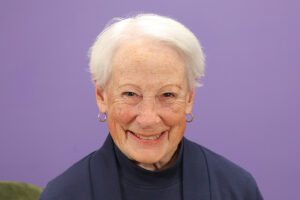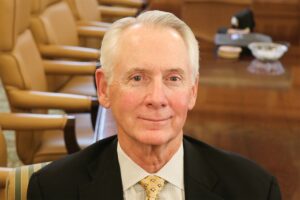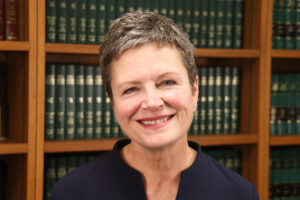
Interview of Nancy Landon Kassebaum Baker, October 17, 2022
Interviewed by Deanell Reece Tacha
Nancy Kassebaum, still lively at age 90, recalled being a young girl in Topeka growing up with a famous father, Alf Landon. She described her motivation for entering a US Senate race in 1978 and turned to friends and the League of Women Voters in Wichita for help with that highly contested primary race. Kassebaum had a "special relationship" with the other Kansas Senator, Bob Dole. Her legislative interests in the U.S. Senate were foreign relations, Africa and apartheid, and a major health care bill she worked with Senator Ted Kennedy. Toward the end of Show Moreher senate career she married Tennessee senator Howard Baker, and went to Japan with him as wife of the Ambassador. After Baker's death she returned to the ranch in Burdick, Kansas where she still follows politics closely. Show Less

Interview of George Wingert, October 28, 2022
Interviewed by David Webb
The "legendary" George Wingert served in the Kansas House from 1971-1978, but his political career spanned 50 years, five governors and countless stories. He learned early on the importance of building connections to the Republican majority and leadership and when to vote your district even if your party leader objects. Wingert was involved with higher education issues and the changes to the correctional institutions and mental health institutions and many of the other progressive issues of that period. After leaving the legislature Governor Carlin appointed him to the Kansas Board of Regents where he and fellow Show Moreregent Jordan Haines "hired and fired" a lot of people including college presidents. Then he lobbied for dog racing issues for another 15 years. The interview concludes with a couple of interesting stories about his family's involvement with national Democratic politicians. Show Less

Interview of George Teagarden, October 28, 2022
Interviewed by Duane Goossen and Joan Wagnon
This interview with George Teagarden covers the 14 years he spent in the House of Representatives, mostly serving on the Ways and Means/Appropriations committee. Teagarden describes the committee whose job was to work the state budget every year. In the early years it was characterized by cooperation and working together on issues regardless of party. He notes that cooperation was changing as he left and becoming much more partisan. The use of provisos often bypassed the traditional legislative route for policy-making. He followed his legislative service by working 16 years as Kansas Livestock Show MoreCommissioner. The livestock industry had appointed him to that job, but it is now a gubernatorial appointment. Show Less

Interview of Kathleen Sebelius, October 28, 2022
Interviewed by Joan Wagnon and Duane Goossen
Kathleen Sebelius ran for the legislature to "go home." Her kids were ages two and five and she was eager to get out of a demanding job to spend more time at home--better work-life balance. In her 2022 oral history interview, she discussed the changes in the culture of the legislature and state government she experienced over the 30-plus years she served in public office. She observed that when both US Senate seats for Kansas came open in 1996, and Sam Brownback challenged incumbent Sheila Frahm for one of the seats, a fissure
Show Morewas created in the Republican party. Sebelius observed the insurance industry being very partisan and tilted toward the industry interests. Her discussion of budget issues during her terms as governor reveals her problem-solving process, even though her time in office was bookended by recessions. School finance also posed some unique challenges during her administration because the Great Recession got in the way of the court's mandates. Phill Kline, the Kansas Attorney General at the time urged Republicans to do nothing regarding school finance. The BEST teams created in the Sebelius administration were important to solving the budget crisis. This interview concludes with discussion of her selections of Lt. Governors and her experiences at the US Department of Health and Human Services (HHS) and her activities after leaving government service.Another oral history interview of Sebelius may be found in the Energy & Environment collection on this site.
Show Less
Interview of Bill Graves, December 5, 2022
Interviewed by Mike Matson
Matson's interview of Governor Graves shows the deep respect Matson has for the man he describes as "the last of the centrist, moderate Republican Kansas governors." The interview reveals the values that guided Graves throughout his 8 years in office--to whom much is given, much is expected. It shows how a well-grounded young man dealt with the news that the career for which he had prepared was no longer an option, and how he earned the respect of 73 percent of the state's voters by winning a second term for Governor. Graves talked about his three most Show Moredifficult decisions: replacing a US Senator (Dole), concealed carry and abortion restrictions. Graves concludes with a discussion of issues he thinks the Republican party should be embracing in the future. Following the interview, Matson wrote a column which summarized Bill Graves' success. It is worth reading. (Download it after the interview transcript.) Show Less

Interview of Thomas (Tim) Owens, October 14, 2022
Interviewed by Nancy Parrish
In this oral history interview, Tim Owens described his career path from military officer to private attorney to city council member to the state legislature. He served seven years in the Kansas House and then ran for the Kansas Senate where he chaired the Senate Judiciary Committee. Owens recounts the pressure from Governor Brownback to change the merit selection procedure for judges, making them elected. Also, the education bills were then being sent to the Judiciary Committee because of lawsuits and that caused friction because of the court's decisions on resolving the Montoy and Gannon school finance Show Morecases. Owens also dealt with a death penalty bill which failed 20-20. He described frequent trips "across the street" carrying messages between the Chief Justice and the Governor's office. He lost his bid for reelection to the Senate in 2012 and afterward taught at Johnson County Community College and retired from the military as a full colonel. He also served a year as municipal judge in Lenexa. Show Less

Interview of Carol Beier, November 23, 2022
Interviewed by Richard Ross
In this 2022 oral history interview, Carol Beier explained how the Kansas judicial branch of government operates, showing how cases get to the Supreme Court and explaining that the justices can only consider facts framed by the parties and their counsel. They don't "Google" for extra facts. They stay in the bounds of the facts as framed by the case. Beier is also an advocate for merit selection of judges and made the case that merit selection is the most appropriate method. She gave examples of how retention elections operate. Beier told a story Show Moreabout a friend living in New York City who asked the question, "What do people do in Kansas?" The answer was "Everything important in life." Beier connected that response to her conclusion: A strong, healthy, supported Judiciary that understands it role and performs it well is part of "everything important in life."
Highlights -- short excerpts from the interview
